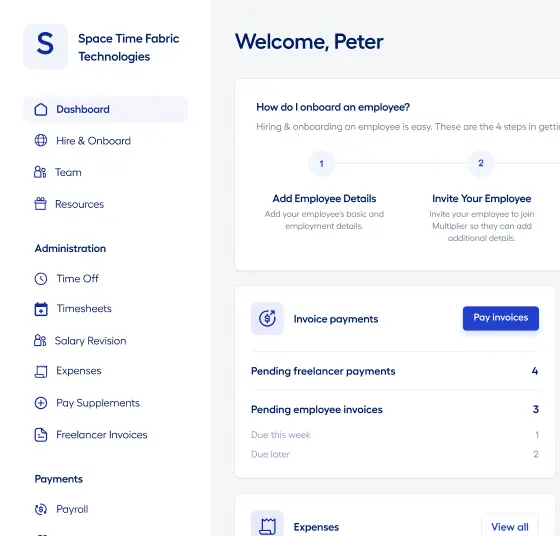Are you planning to employ both employees and independent contractors?
Then, perhaps, you should know everything about independent contractors vs. employees.
By definition, the difference between an employee and an independent contractor is that an employee is a long-term worker in your organization. Whereas independent contractors generally work on a contractual basis.
Besides, there are several other differences in contractor vs. employee that you will learn about as you read on.
So, without any delay, let’s get started!
What are The Classifications of Workers for Taxation?
Misclassification of workers can result in penalties for your business. Now, you know why it is crucial to understand independent contractors vs. employee taxes.
First off, if a worker is classified as an employee, you need to withhold, deposit, report, and make payment of employment taxes. Plus, you also need to withhold and pay Social Security and Medicare taxes and unemployment taxes on their compensation. Also, the documentation of taxes is different in a contractor versus an employee.
If a worker falls under the category of an independent contractor, there’s not much work to be done for the employer. Independent contractors file and pay their income taxes. Plus, unlike employees, they are not entitled to any benefits and stuff like unemployment insurance.
It might be an issue if you aren’t aware of the basic taxation.
Why?
Not withholding taxes and benefits not only creates an undue burden on contractors and employees. But also, you might have to pay penalties in case of any misclassifications related to work. So, knowing the taxation rules is important.
Differences between an Employee and an Independent Contractor
When in doubt whether a worker is an employee or independent contractor, you must check out a few factors.
These factors included in the employee vs contractor checklist must be ticked off before you can conclude a worker is an employee or independent contractor.
So, let’s see what these factor-based differences are.
1. Compensation
When you hire an employee, they provide their services for a fixed monthly remuneration. In case of independent contractors, the payment terms may vary. They might opt for a monthly payment, per project, bi-monthly, or even hourly payment. A few independent contractors in industries like construction or real estate might even ask for an advance deposit.
2. Working hours
Considering the working hours for independent contractors vs. employees, employers decide the time and schedule for employees. But independent contractors are their bosses. They decide when and how to work. So, employers need to provide independent contractors with the necessary details and due dates. The independent contractor controls the process of completing the work.
3. Benefits
The difference between an independent contractor and an employee is that employees are entitled to employee benefits, and contractors are not. Employees are entitled to insurance, pension schemes, paid leaves, conveyance or travel expenses, emergency leaves, etc. However, independent contractors are not entitled to any of these.
Besides these, a few other benefits and protections are available only to employees such as;
- FICA tax payments
- Retirement and health benefits; and
- Workers’ compensation insurance
4. Taxation
When it comes to taxation, there are several independent contractors vs. employee tax differences.
Firstly, employee taxes are withheld and paid by employers. The employers are required to withhold and pay Social Security and Medicare, plus unemployment taxes from the employee remuneration. Whereas independent contractors pay their taxes themselves – be it Medicare or Social security or income taxes.
Again, during tax payments, employers report all the payments made to employees on a W-2 form. Whereas, for independent contractors, if the price is $600 or more in a financial year, it is reported on Form 1099.
Further, the tax documents for individual contractors vs. employees are also different. In case of employees, the name, address, Social Security number, tax filing status, and the number of exemptions are reported on Form W-4. Whereas independent contractors report name, address, Taxpayer Identification Number, and certification about backup withholding on Form W-9.
5. Work expenses
Here, the difference between an employee and an independent contractor is that the employers bear the expenses made by employees during a job. But in the case of independent contractors, the expenses incurred are borne by them and not the employer.
6. Employment laws
Employees are covered by several federal and state employment laws as well as labor laws. On the other hand, independent contractors are not covered by any employment or labor laws.
7. Source of income
For an employee, the source of income is their salary that gets credited every month from the employer. Whereas, for independent contractors, the source of income is multiple as they work with several clients. So, payment from each determines their total income.
8. Independence
The employer generally controls employee performance. They have little to no independence when it comes to performing a job. They are trained, supervised, and directed by employers. On the other hand, independent contractors work independently. You simply need to provide the work details and due date; they decide the rest.
9. Relationship status
Employees generally have a continuing relationship with the employer. In other words, they are hired with an intention to work for a long period. Whereas independent contractors have a contractual relationship. They are generally hired for a short period.
10. Inputs
In case of employees, inputs related to their work are provided by the employer. In the case of independent contractors, employers provide the requirements but not the inputs. The contractors generally use their own expertise and provide inputs for the job.
Three Tests to Identify between an Employee and an Independent Contractor
When finding out the difference between an employee and an independent contractor, no single factor can help you identify.
The IRS suggests assessing the relationship a worker has with the employer based on three broad categories. So, if you are not certain about whether a worker is an employee or independent contractor, take these three tests.
1. Behavioral control
This category refers to the extent of control you can exert over the worker’s time, schedule, and tools. Considering these aspects, a worker is classified as an employee or independent contractor.
Suppose you are responsible for training the worker, supervising the job, appraising it, setting the work schedule, and process. In that case, the IRS is more likely to consider the worker as an employee. In other words, if you can dictate the worker’s way of doing the job, then the worker classifies as an employee.
On the other hand, if the worker sets their own work schedule and decides how and when the work will be done, it indicates independent contractors.
So, when hiring an independent contractor, make sure that there is no confusion regarding the extent of control. Don’t forget that only the outcome of the work will be under your control. How and when the job is done will be decided by the contractor. If you prefer to supervise the job yourself, then hiring an employee works better.
2. Financial control
Here, the difference between contract employees and independent contractors is that employees receive a regular company wage. At the same time, independent contractors are most likely to be paid a flat fee per project.
Also, if workers have a significant investment in their business, like equipment, training, licensing, etc., they are classified as independent contractors. The contractors do not receive any reimbursements for expenses like utilities, tools, office supplies, etc. Unlike employees, contractors might incur losses and gain profits, just like other small businesses.
On the other hand, if a worker has no such investment and all of their work-related expenses are borne by employers, they will be classified as employees.
3. Type of relationship
The relationship you share with a worker also affects their classification.
If a worker provides services related to your core business work, then the IRS is most likely to classify the worker as an employee. Plus, if you grant them benefits like paid leave, sick days, health insurance, they are most likely to be classified as employees.
Independent contractors are generally hired for a short-term or to carry out a specific project due to the duration or’ permanency’. If you hire someone for the long term and expect them to work for an indefinite period, they will probably be classified as employees.
For instance, suppose you hire four workers to manage the orders at your coffee shop at an hourly payment of $30. You are most likely hiring employees because you expect them to work for an indefinite period.
On the other hand, suppose you hire a graphic designer for your social media marketing campaign for the coffee shop. You pay the designer a lumpsum to design the campaign requirements for a specific period. In this case, you are hiring an independent contractor.
Tax Forms for Independent Contractor vs. Employee
When discussing independent contractor taxes vs. employees, you need to fill out different forms depending on whether you are hiring an employee or an independent contractor.
In the case of independent contractors, you must arrange for Form W-9. Plus, you must give each independent contractor Form 1099-MISC whom you have paid $600 or more during the taxation year.
For each of your employees, you are required to file Form W-2 along with withholding and paying certain other taxes and benefits.
Why does Misclassification Happen and How Can You Prevent it?
Misclassification of employees might happen intentionally or unintentionally. While unintentional misclassification has no reason, intentional misclassification might be carried out to skip paying the taxes.
At times, both corporations and small businesses choose to cut down on their costs or save their bucks. However, most of the time, genuinely not knowing whether a worker is a contractor or employee is the reason behind misclassification.
To prevent misclassification of workers, you need to stay updated and equip yourself with the knowledge of the IRS’ definition of employees and independent contractors. When in doubt, consult a professional.
Further, remember that misclassifying employees as contractors attracts higher penalties than misclassifying contractors as employees. If you can hire both and have the option of hiring both and setting a budget for it, it is safe to hire an employee.
Additionally, you also have the option to file Form SS-8 (Determination of Worker Status for Purposes of Federal Employment Taxes and Income Tax Withholding). The filing of this form requests a formal process to determine a worker’s status in the organization.
What Happens if You Misclassify an Employee or an Independent Contractor?
Between the contractor vs. employee fuss, if you misclassify an employee as an independent contractor or vice versa, it will result in huge penalties.
When the IRS finds about a business misclassifying employees as contractors, you might receive an order to pay back taxes as well as penalties for income taxes, Social Security, Medicare, and unemployment taxes.
Besides this, you might also face strict and expensive civil penalties. Also, if you misclassify employees as independent contractors, they might sue you for the benefits that they were denied. For instance, overtime pay, health insurance, paid leaves, and minimum wage.
You might also need to provide newly designated employees with their rightful benefits depending on your position.
It’s Time to Ease the Hiring of Independent Contractors with Multiplier
Are you aware of the hiring process of an independent contractor? Can you differentiate between an independent contractor and an employee? If not, no worries! All you need is an advanced platform that can help you figure it all out!
And we recommend the onboarding SaaS platform – Multiplier.
Here’s what it does for you:
- Generating compliant contracts to hire independent contractors
- Simplifying the payment of global contractors with a simple click
- Providing the necessary perks and benefits to the independent contractors
There is more to it. Book a demo now!







